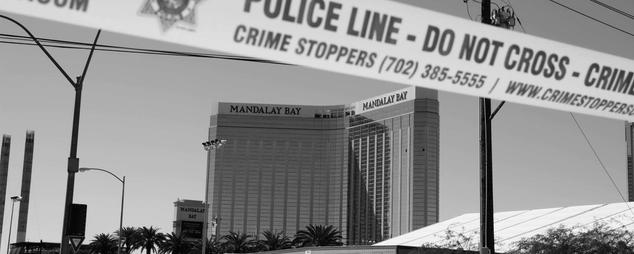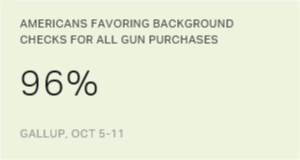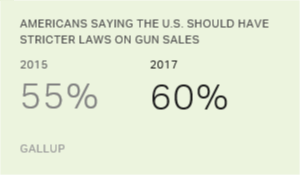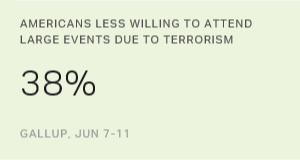Story Highlights
- The 39% who worry now is little changed from December 2015
- Democrats have become more worried, Republicans less worried
- Americans split on whether new gun laws would reduce mass shootings
WASHINGTON, D.C. -- About four in 10 Americans are "very" or "somewhat" worried that they or someone in their family will become a victim of a mass shooting. These data are from a Gallup poll taken Oct. 5-11, after a mass shooting in Las Vegas on Oct. 1 left 58 dead. Americans' anxiety is similar to the level found after the San Bernardino shooting in December 2015 that left 14 dead.
| Very worried | Somewhat worried | Not too worried | Not worried at all | ||||||||||||||||||||||||||||||||||||||||||||||||||||||||||||||||||||||||||||||||||||||||||||||||
|---|---|---|---|---|---|---|---|---|---|---|---|---|---|---|---|---|---|---|---|---|---|---|---|---|---|---|---|---|---|---|---|---|---|---|---|---|---|---|---|---|---|---|---|---|---|---|---|---|---|---|---|---|---|---|---|---|---|---|---|---|---|---|---|---|---|---|---|---|---|---|---|---|---|---|---|---|---|---|---|---|---|---|---|---|---|---|---|---|---|---|---|---|---|---|---|---|---|---|---|
| % | % | % | % | ||||||||||||||||||||||||||||||||||||||||||||||||||||||||||||||||||||||||||||||||||||||||||||||||
| Oct. 5-11, 2017 | 10 | 29 | 34 | 26 | |||||||||||||||||||||||||||||||||||||||||||||||||||||||||||||||||||||||||||||||||||||||||||||||
| Dec. 11-12, 2015 | 11 | 27 | 35 | 27 | |||||||||||||||||||||||||||||||||||||||||||||||||||||||||||||||||||||||||||||||||||||||||||||||
| Gallup | |||||||||||||||||||||||||||||||||||||||||||||||||||||||||||||||||||||||||||||||||||||||||||||||||||
Overall, 10% of Americans are very worried, 29% are somewhat worried and a total of 60% report being "not too worried" or "not worried at all."
Gallup has asked this "worry" question only twice -- both times after high-profile attacks -- so it is possible that concern about mass shootings would be lower if the question were asked at other times. Still, the similarity of responses between December 2015 and now shows little evidence that worry is "ratcheting up" as these tragic events accumulate.

Gallup Analytics
Subscribe to our online platform and access nearly a century of primary data.
Worry about being the victim of a mass shooting is closely linked to partisanship, albeit not in a fixed manner. In 2015, with Democrat Barack Obama in the White House, Republicans were significantly more likely than Democrats to say they were worried. Now, with a Republican president, the two partisan groups have flipped and Democrats have become more worried.
| December 2015 | October 2017 | Change | |||||||||||||||||||||||||||||||||||||||||||||||||||||||||||||||||||||||||||||||||||||||||||||||||
|---|---|---|---|---|---|---|---|---|---|---|---|---|---|---|---|---|---|---|---|---|---|---|---|---|---|---|---|---|---|---|---|---|---|---|---|---|---|---|---|---|---|---|---|---|---|---|---|---|---|---|---|---|---|---|---|---|---|---|---|---|---|---|---|---|---|---|---|---|---|---|---|---|---|---|---|---|---|---|---|---|---|---|---|---|---|---|---|---|---|---|---|---|---|---|---|---|---|---|---|
| % | % | pct. pts. | |||||||||||||||||||||||||||||||||||||||||||||||||||||||||||||||||||||||||||||||||||||||||||||||||
| Republicans/leaners | 46 | 27 | -19 | ||||||||||||||||||||||||||||||||||||||||||||||||||||||||||||||||||||||||||||||||||||||||||||||||
| Democrats/leaners | 32 | 49 | +17 | ||||||||||||||||||||||||||||||||||||||||||||||||||||||||||||||||||||||||||||||||||||||||||||||||
| Gallup | |||||||||||||||||||||||||||||||||||||||||||||||||||||||||||||||||||||||||||||||||||||||||||||||||||
This shift in concern about being personally affected by a mass shooting reflects the same pattern seen on a number of other measures following a change in control of the White House. Partisans clearly find it hard to be positive on many measures when the presidency is in the hands of the other party, including on this one.
There are differences in worry across other population subgroups as well. Women are twice as likely to be worried as men are, and those under 55 are more worried than those who are older. Gun owners are less worried than those who do not personally own a gun. Additionally, Americans who say that gun laws should be made stricter are more than twice as likely to be worried as those who want gun laws to stay the same or become less strict.
| Very or somewhat worried | ||||||||||||||||||||||||||||||||||||||||||||||||||||||||||||||||||||||||||||||||||||||||||||||||||||
|---|---|---|---|---|---|---|---|---|---|---|---|---|---|---|---|---|---|---|---|---|---|---|---|---|---|---|---|---|---|---|---|---|---|---|---|---|---|---|---|---|---|---|---|---|---|---|---|---|---|---|---|---|---|---|---|---|---|---|---|---|---|---|---|---|---|---|---|---|---|---|---|---|---|---|---|---|---|---|---|---|---|---|---|---|---|---|---|---|---|---|---|---|---|---|---|---|---|---|---|---|
| % | ||||||||||||||||||||||||||||||||||||||||||||||||||||||||||||||||||||||||||||||||||||||||||||||||||||
| Gender | ||||||||||||||||||||||||||||||||||||||||||||||||||||||||||||||||||||||||||||||||||||||||||||||||||||
| Men | 26 | |||||||||||||||||||||||||||||||||||||||||||||||||||||||||||||||||||||||||||||||||||||||||||||||||||
| Women | 53 | |||||||||||||||||||||||||||||||||||||||||||||||||||||||||||||||||||||||||||||||||||||||||||||||||||
| Age | ||||||||||||||||||||||||||||||||||||||||||||||||||||||||||||||||||||||||||||||||||||||||||||||||||||
| 18 to 34 | 47 | |||||||||||||||||||||||||||||||||||||||||||||||||||||||||||||||||||||||||||||||||||||||||||||||||||
| 35 to 54 | 41 | |||||||||||||||||||||||||||||||||||||||||||||||||||||||||||||||||||||||||||||||||||||||||||||||||||
| 55 and older | 33 | |||||||||||||||||||||||||||||||||||||||||||||||||||||||||||||||||||||||||||||||||||||||||||||||||||
| Gun or non-gun owner | ||||||||||||||||||||||||||||||||||||||||||||||||||||||||||||||||||||||||||||||||||||||||||||||||||||
| Personally own gun | 23 | |||||||||||||||||||||||||||||||||||||||||||||||||||||||||||||||||||||||||||||||||||||||||||||||||||
| Do not personally own gun | 47 | |||||||||||||||||||||||||||||||||||||||||||||||||||||||||||||||||||||||||||||||||||||||||||||||||||
| Gun laws | ||||||||||||||||||||||||||||||||||||||||||||||||||||||||||||||||||||||||||||||||||||||||||||||||||||
| Want stricter gun laws | 50 | |||||||||||||||||||||||||||||||||||||||||||||||||||||||||||||||||||||||||||||||||||||||||||||||||||
| Want gun laws the same or less strict | 24 | |||||||||||||||||||||||||||||||||||||||||||||||||||||||||||||||||||||||||||||||||||||||||||||||||||
| Gallup, Oct. 5-11, 2017 | ||||||||||||||||||||||||||||||||||||||||||||||||||||||||||||||||||||||||||||||||||||||||||||||||||||
Less Than Half Think New Gun Laws Would Reduce Mass Shootings
The Las Vegas incident has brought renewed calls for tougher gun regulations in the U.S., but Americans are not convinced such laws would help reduce mass shootings. Forty-one percent of Americans say such laws would have a great deal of (21%) or moderate (20%) impact on these types of events. Effectively as many -- 42% -- say that new gun laws would have no effect on mass shootings, while 16% say new laws would reduce them a little.
| A great deal/Moderate amount | A little | Not at all | |||||||||||||||||||||||||||||||||||||||||||||||||||||||||||||||||||||||||||||||||||||||||||||||||
|---|---|---|---|---|---|---|---|---|---|---|---|---|---|---|---|---|---|---|---|---|---|---|---|---|---|---|---|---|---|---|---|---|---|---|---|---|---|---|---|---|---|---|---|---|---|---|---|---|---|---|---|---|---|---|---|---|---|---|---|---|---|---|---|---|---|---|---|---|---|---|---|---|---|---|---|---|---|---|---|---|---|---|---|---|---|---|---|---|---|---|---|---|---|---|---|---|---|---|---|
| % | % | % | |||||||||||||||||||||||||||||||||||||||||||||||||||||||||||||||||||||||||||||||||||||||||||||||||
| U.S. adults | 41 | 16 | 42 | ||||||||||||||||||||||||||||||||||||||||||||||||||||||||||||||||||||||||||||||||||||||||||||||||
| Republicans/leaners | 15 | 14 | 71 | ||||||||||||||||||||||||||||||||||||||||||||||||||||||||||||||||||||||||||||||||||||||||||||||||
| Democrats/leaners | 63 | 19 | 17 | ||||||||||||||||||||||||||||||||||||||||||||||||||||||||||||||||||||||||||||||||||||||||||||||||
| Gallup, Oct. 5-11, 2017 | |||||||||||||||||||||||||||||||||||||||||||||||||||||||||||||||||||||||||||||||||||||||||||||||||||
Republicans and Democrats vary widely in their views on gun control laws, and the perceived effectiveness of new gun laws on reducing mass shootings is no different. Sixty-three percent of Democrats say such laws would have a great deal of or a moderate effect on reducing mass shootings, while 71% of Republicans say such laws would have no impact. This finding underscores one key rationale for Republicans' reluctance to support new gun control measures.
Bottom Line
While the Las Vegas mass shooting was the deadliest in modern U.S. history, Americans' worry about becoming a victim of such a shooting is similar to the concern Gallup measured after the shooting in San Bernardino two years ago. The public may be growing accustomed to these events and taking them more as a matter of course without heightened worry, even shortly after they occur.
There have been concerted efforts since the Columbine shootings in 1999 to figure out how to prevent such events, with no real consensus on what would work. Obviously, the frequency with which such shootings now occur demonstrates the need to do something to stop them.
Many Democratic lawmakers advocate stricter gun laws as one remedy, and on that they have the support of their rank-and-file partisans, the majority of whom say such measures would be effective. But Republican lawmakers have been reluctant to go along with new gun laws, and with over 70% of Republicans nationwide believing that these laws would have no impact on reducing mass shootings, party leaders have little constituent pressure to change their minds.
Survey Methods
Results for this Gallup poll are based on telephone interviews conducted Oct. 5-11, 2017, with a random sample of 1,028 adults, aged 18 and older, living in all 50 U.S. states and the District of Columbia. For results based on the total sample of national adults, the margin of sampling error is ±4 percentage points at the 95% confidence level. All reported margins of sampling error include computed design effects for weighting.
Each sample of national adults includes a minimum quota of 70% cellphone respondents and 30% landline respondents, with additional minimum quotas by time zone within region. Landline and cellular telephone numbers are selected using random-digit-dial methods.
View survey methodology, complete question responses and trends.
Learn more about how the Gallup Poll Social Series works.




